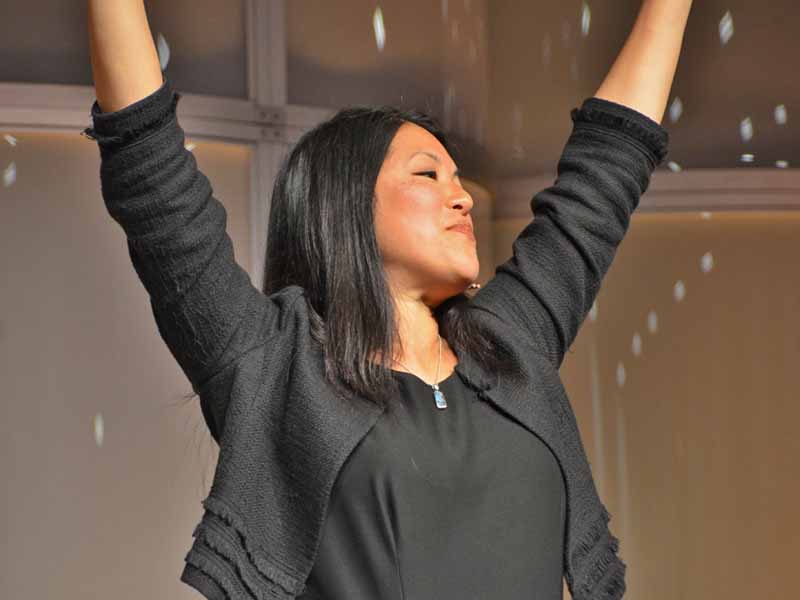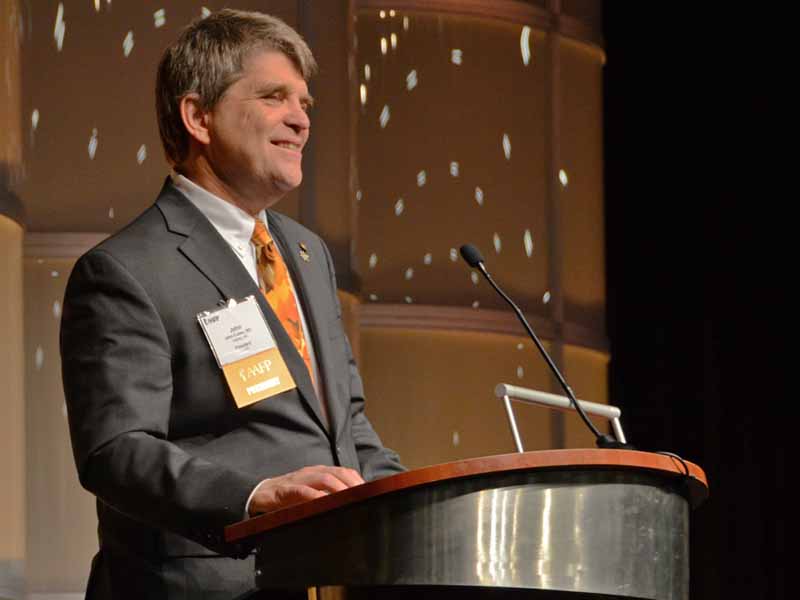Family Physicians Learn to Say 'Yes, And …'
April 26, 2019 03:50 pm Scott Wilson Kansas City, Mo. – A funny thing happened to Belinda Fu, M.D., when she developed cancer, sank into a depression, stepped away from her work and traveled to another continent.
The Seattle family physician got well, she got bold -- and she got better at her job.
The funny part was how. During that journey between unamusing extremes, she committed herself to the lessons of a discipline very different from medicine but, she said, not unrelated: improvisational performance.
"Improv teaches you attunement -- to listen, to learn, to perceive," Fu said April 25 during the plenary kicking off the 2019 National Conference of Constituency Leaders here. It's a skill set she espouses as the "ImprovDoc," splitting her time among improv instruction, medical practice and her duties as a clinical assistant professor in the Department of Family Medicine at the University of Washington in Seattle.

Belinda Fu, M.D., leads fellow family physicians in a practice "failure bow" during the April 25 plenary at the 2019 AAFP National Conference of Constituency Leaders.
"It's your job not to let silence happen," she told an audience of hundreds. Paraphrasing the poet Marianne Williamson, she added: "Speaking up is not selfish. You are shining your light so others will be inspired to share theirs."
Fu's message dovetailed neatly with opening remarks by AAFP President John Cullen, M.D., of Valdez, Alaska. The Academy, he said, was enjoying its "most momentous week in at least a decade" -- in which it was heard by federal agencies and was eager to listen to its own members.
"We may have blown up fee-for-service this week," he said, referring to the announcement just days earlier that CMS plans to launch new value-based payment models that were influenced, in part, by the AAFP.
That morning, with family physicians from underrepresented constituencies -- women, minorities, new physicians, international medical graduates, and LGBT physicians and those who support LGBT issues -- gathered at NCCL to move family medicine forward, Cullen asked members to build on that momentum.
Story Highlights
"Favor quality over quantity," he advised constituents before they began their resolution writing. "This is not the time to be timid. Historically, family physicians have been nice. This is not the time to be nice."
Overcoming the limits of niceness was central to Fu's message. Taking the stage after Cullen, she said that a very familiar-sounding drive to please others was at the root of her story: one of a high-achieving teenager whose goal was "to do everything right, to be the good girl, to get the A-plus" and become a high-achieving physician.
"That kid, that 18-year-old, was very sweet, very creative. I sang show tunes, made up songs, made up poems and stories, couldn't wait to join the college a cappella group," she said. "But I didn't even try out for the group. I started singing quieter and quieter. And it wasn't just my voice getting softer, but my opinions. I was afraid to say the wrong thing."
Still, she completed her medical training and pushed back against classic impostor syndrome symptoms with a checklist of quantifiable results: "a cool job out of residency at a fancy medical startup; a house on a hill with a view; a new car; a dog; a hot young boyfriend."
It all looked good on the outside, Fu said. "But on the inside, things had never been worse. Trying to make it all look easy was eroding my soul. I was unable to state my own opinion because I was so afraid anything I did might be wrong."
But what went wrong was out of Fu's hands. First, her dog was diagnosed with cancer. Then she was told she had cancer, too.
Here, she paused the life-or-death tale and flashed back to her first engagement with improv -- "a random class," she said, that recalled her theater-geek youth but required a different mindset.
"The reason improv works like magic is because it operates by a set of rules and uses a set of cultivated skills," Fu said. "Soldiers in battle don't rise to the occasion. They fall back to their last level of training. I think of improv this way -- falling back on what you know in unexpected circumstances."
A circumstance the exceptionally well-trained morning audience might have anticipated came next as Fu called on the quiet group to take a sort of improv oath with her.

AAFP President John Cullen, M.D., opens the 2019 AAFP National Conference of Constituency Leaders by noting what a "momentous week" it's been for the Academy and its members.
"Imagine this room is small, and there's 15 of us here and no tables or chairs, just an open play space, and we agree early on a set of five values to start with," she said.
"First: I don't have to be amazing. Could you say that, please?"
The audience hesitated for an instant and then complied.
"This ran counter to everything I believed," Fu said, then moved on to the next tenet.
"Two: I know everything I need to know. Please say that."
Scores of physicians agreed they knew everything they needed to know.
"Three: There's no mistakes, only gifts. Repeat that, please."
Again, a chorus.
"Four: We're here to take care of each other. Please repeat that."
And then the last one: "Five: We celebrate our failure. No way you don't celebrate failure."
Now she wanted more rigorous participation.
Fu's improv coach taught her, she said, the importance of taking a physical bow -- "a big circus bow" -- after every mistake. And she told the room it was time for them to stand and practice, throwing her own arms in the air and leading the group in a full-bodied acknowledgement of that next inevitable humbling.
Her own was still on the way, she said, picking up her post-cancer narrative.
"I got through that summer, that surgery," she said, adding that she remains cancer-free today. "But I was bereft -- that was the only word that came to mind. I just laid in bed. I felt naked, like the world could see how flawed I actually was. I called my boss and said I couldn't come back to work on Monday. He heard that and said, 'Take the time you need.'"
She did. Fu left her dog with friends, closed up her house and escaped Seattle for four months of couch-surfing and reading the Twilight novels.
"I just emptied my brain," she said. "And in the fourth month, I went to Australia by myself so I could learn to listen. In improv, you listen to your scene partner, but you have to listen to yourself, too. I couldn't hear myself.
"In improv, there are three circles of presence," she went on. "The first circle is completely inner, closed off. You say nothing in the first circle, just stand there and contribute nothing. The third circle looks outward. You steamroll. The second circle is balance: You're perceiving what's on the inside and on the outside.
"You need to be in the second circle. You need to acknowledge: I sense you. I see you. I see myself, as well."
This was what she taught herself to do in Australia. She remembered coming to a street corner and wondering which way to turn. She went right. She moved her feet, she said. She followed her own voice.
"If you have a great idea but you don't say it out loud, nothing happens," Fu said. "That's the 'Yes, and' you hear when people talk about improv. You say 'yes,' then add information. Each thing said is an offer, and I accept it and I move on."
Fu led another all-in practice, concentrating, she said, on "the affirming and advancing part."
"Our instinct, when we have an idea or a good thought, is often to shut it down," she said. "What do you do when someone gives you a compliment? For me, it was always, 'Oh, no, shucks.' We just undersell ourselves real quick. But what if instead we said, "Yes, and," in a second-circle way? What if someone said, 'You have nice skin,' and you said, 'Thank you. I'm grateful to have nice skin -- I spend less on moisturizer.'"
Fu invited her audience to pay one another compliments and practice accepting them without deflection, then trade "I am" and "I believe" statements. Neither was an easy assignment. The room swelled with shy murmuring and self-effacing chuckles. A man could be heard admitting, "I'm so bad at this."
"Some of you may not have felt this was easy," Fu said as the room quieted again. "How did that feel?"
"Awkward," someone replied.
"Yeah, totes," Fu agreed. "But when things are awkward, that's when you're learning something. I'd venture to say we don't use this approach as much as we should: attuning to yourself and others, affirming what you heard inside and outside, then moving the conversation forward, advancing."
Fu's conversation with herself took her back to Seattle, where she picked up her dog, aired out her house and went back to work. But now her voice was telling her something else: Do something different.
"My voice said that improv should be in medical education," Fu said. She recounted contacting Katie Watson, J.D., who teaches law, ethics and humanities to medical students at Northwestern University and who would become her partner in an improv workshop.(www.medicalimprov.org)
"The old me would have thought that was a bad idea," Fu said. "But we're in our sixth year."
And her audience had now had its first improv lesson.
Earlier, Cullen had recognized the week's news as an affirmation: "We've been asking for things," he said, "and someone said, 'OK, sure.'"
To keep advancing, Fu said, individual physicians needed to echo that with their own "Yes, ands."
"You're here to tell your stories, in your own voices and your collective voice," Fu said. "Sometimes the AAFP is a large voice, in the third circle, taking up a lot of space. We need third- and first-circle people to find that second circle. It's upon each and every one of you to find your voice, affirm it and share it out loud."
"When all people speak up, things can change for the better. That's why you're here -- so all people can speak up."
More From AAFP
FPM: Improving Patient Care: Keys to Improving Your Listening Skills
(April 2005)